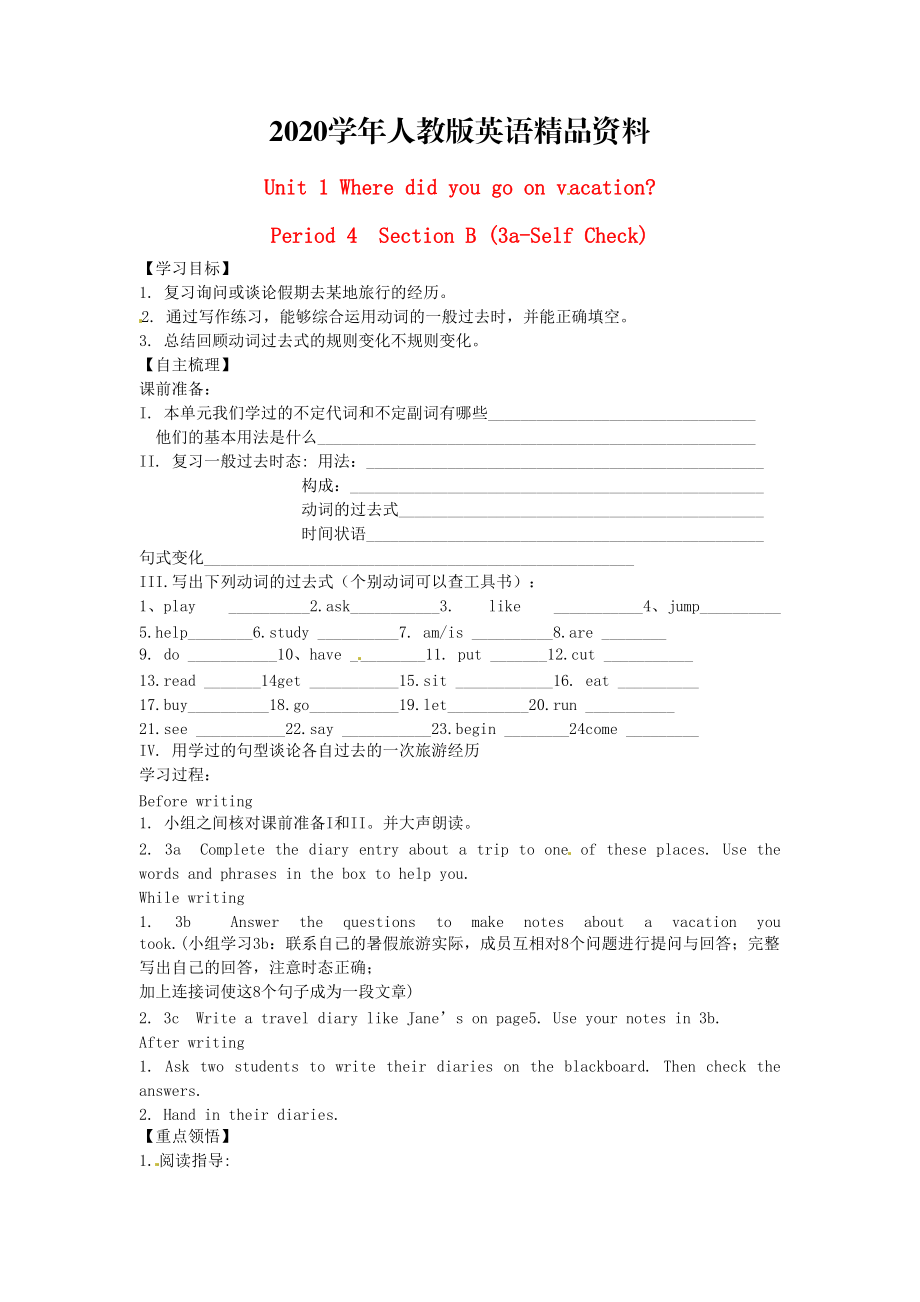《2020八年級英語上冊 Unit 1 4 Section B3aSelf Check學(xué)案》由會員分享�,可在線閱讀�,更多相關(guān)《2020八年級英語上冊 Unit 1 4 Section B3aSelf Check學(xué)案(3頁珍藏版)》請?jiān)谘b配圖網(wǎng)上搜索。
1����、2020學(xué)年人教版英語精品資料
Unit 1 Where did you go on vacation?
Period 4 Section B (3a-Self Check)
【學(xué)習(xí)目標(biāo)】
1. 復(fù)習(xí)詢問或談?wù)摷倨谌ツ车芈眯械慕?jīng)歷。
2. 通過寫作練習(xí)�,能夠綜合運(yùn)用動詞的一般過去時,并能正確填空��。
3. 總結(jié)回顧動詞過去式的規(guī)則變化不規(guī)則變化���。
【自主梳理】
課前準(zhǔn)備:
I. 本單元我們學(xué)過的不定代詞和不定副詞有哪些_________________________________
他們的基本用法是什么__________________________________
2�����、____________________
II. 復(fù)習(xí)一般過去時態(tài): 用法:_________________________________________________
構(gòu)成:___________________________________________________
動詞的過去式_____________________________________________
時間狀語_____________________________________
3��、____________ 句式變化_____________________________________________________
III.寫出下列動詞的過去式(個別動詞可以查工具書):
1��、play __________2.ask___________3. like ___________4����、jump__________
5.help________6.study __________7. am/is __________8.are ________
9. do ___________10、have _________11.
4���、 put _______12.cut ___________
13.read _______14get ___________15.sit ____________16. eat __________
17.buy__________18.go___________19.let__________20.run ___________
21.see ___________22.say ___________23.begin ________24come _________
IV. 用學(xué)過的句型談?wù)摳髯赃^去的一次旅游經(jīng)歷
學(xué)習(xí)過程:
Before writing
1. 小組之間核對課
5�����、前準(zhǔn)備I和II。并大聲朗讀�。
2. 3a Complete the diary entry about a trip to one of these places. Use the words and phrases in the box to help you.
While writing
1. 3b Answer the questions to make notes about a vacation you took.(小組學(xué)習(xí)3b:聯(lián)系自己的暑假旅游實(shí)際,成員互相對8個問題進(jìn)行提問與回答���;完整寫出自己的回答�,注意時態(tài)正確��;
加上連接詞使這8個句子成為一段文章)
2. 3c
6�、 Write a travel diary like Jane’s on page5. Use your notes in 3b.
After writing
1. Ask two students to write their diaries on the blackboard. Then check the answers.
2. Hand in their diaries.
【重點(diǎn)領(lǐng)悟】
1.閱讀指導(dǎo):
首先����,應(yīng)閱讀日記一遍�,了解日記的大意。然后��,細(xì)讀每一句��,根據(jù)上下文文意來確定每個空格處應(yīng)填的詞匯�。比如:讀第一行可知此處是填空記日記時的時間,空格后面有日期����,因此空格處應(yīng)
7、填月份August��。讀第二句話�����,可知空格處應(yīng)填寫天氣的詞匯�,故應(yīng)選hot and sunny。其他類似����。
2.寫作指導(dǎo):
本文為寫日記�����, 因此應(yīng)用一般過去時態(tài)�����。應(yīng)注意動詞的過去式形式��。 回顧一下在3b中所回答的問題的情況�����,然后將這些句子按恰當(dāng)?shù)倪壿嬳樞蚺帕性谝黄?��,形成條理清晰的一段文字?���?梢愿鶕?jù)旅行的經(jīng)歷再添加一些恰當(dāng)?shù)南胂蟮木渥?���。再次,閱讀一遍短文��,看有沒有錯誤的句子。
【探究提升】
書面表達(dá)
假如你在暑假期間參加了為期三天的夏令營����,請根據(jù)下表中的信息寫一篇日記,記述這次夏令營的活動及感受���。要求:日記應(yīng)包含表中所有信息����;不少于60詞���。
Time
Activity
The fi
8���、rst day
go to the beach, go swimming
The second day
go to the mountains
The third day
have a party, sing and dance
Thursday, August 18
___________________________________________________________________________________________________________________________________________________________
9、_____________________________________________________________________________________________________________________________________________________________________________________________
【鞏固訓(xùn)練】
I.用括號內(nèi)詞的適當(dāng)形式填空:
1. She _________(not visit) her aunt last weekend. She ________ (stay) at home and _
10���、________(do) some cleaning.
2. When _____ you _________(write) this song? I ______(write) it last year.
3. Carol___________(study) for the math test and __________(practice) English last night.
4. A:________ Mr. Li __________(do) the project on Monday morning?
B:Yes, he _________.
5. A:How ___
11����、______(be) Jims weekend?
B:It _________(be not) bad.
【學(xué)習(xí)反思】
1. 在談?wù)撐覀冞^去的經(jīng)歷時���,可以從哪些方面寫��?要用什么時態(tài)�����?
答案:
【自主梳理】
1. played 2.asked 3.liked 4.jumped 5.helped 6.studied 7.was 8.were 9.did 10.had 11.put 12.cut 13.read 14.got 15.sat 16.ate 17.bought 18.went 19.let 20.ran 21.saw 22.said
12�����、 23.began 24.came
【探究提升】
Thursday, August 18
Last summer,I went to summer camp with my friend.
On the first day ,it was sunny and a little hot.I went to the beach and went swimming.It was cool.On the second day,it was cloudy.I went to the mountains.I was tired but happy.O the third day ,the weather was rainy.we had a party .I sang and danced at the party.I was happy.
【鞏固訓(xùn)練】
1. didn’t visit ; stayed ; did
2. did; write ; wrote
3. studied; practiced
4. Did ;do ; did
5. was;wasn’t
 2020八年級英語上冊 Unit 1 4 Section B3aSelf Check學(xué)案
2020八年級英語上冊 Unit 1 4 Section B3aSelf Check學(xué)案

